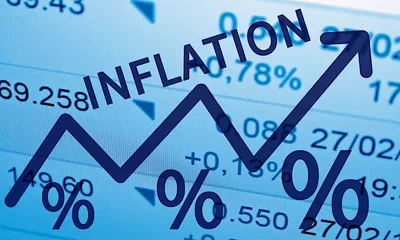Health
6 signs that indicate you’re eating too much carbohydrate foods
Published
4 years agoon
By
Olu Emmanuel
The truth is that sugar is a necessary source of energy and a necessity for human life, despite the negative connotations attached to it. However, not all sugars are alike. For example, fruits and vegetables contain fructose and lactose, both of which are naturally occurring sugars that we don’t have to worry about because they also contain fiber and calcium. To be honest, we could all do without the added sugars present in processed foods, which are unfortunately very common in our diets.
The average American consumes 270 calories of added sugars, or 17 teaspoons, per day, according to the Dietary Guidelines for Americans 2020–2025.
Added sugars include both natural sugars like honey and maple syrup, as well as artificial sugars like agave nectar. According to Jessica Cording, RD, a New York City health coach and author of The Little Book of Game Changers, “Even if they may be more healthy than table sugar, it still contributes more calories but not much in the way of vitamins and minerals.”
1. Irritability
Stress may not be the only cause of your moodiness, irritability, or restlessness; it could also be a symptom that you’re consuming too much sugar.
Eating additional sugars, according to a study published in the journal Medical Hypotheses in January 2020, might cause inflammation, impair mood, and increase depressive symptoms.
As your body races to metabolize all of the sugar in a high-sugar meal or snack, your energy levels drop, making you feel sluggish and angry, according to Cording.
In addition, when blood glucose levels in the brain are low because insulin levels have risen after consuming a large amount of added sugar, so are the levels of glucose in the bloodstream. A healthy blood sugar level is essential for the proper functioning of our brains, as Li explains.
Pay attention to your body when you’re feeling out of sorts. Excess sugar may be to blame, for example, if you become irritated an hour after eating a snack or at the same time every day. For those who have noticed this happening frequently, Cording recommends examining your diet.
2. Fatigue and Low Energy
A high sugar intake may be to blame for your exhaustion, as sugar is readily absorbed and digested.
In 30 minutes, “no matter how much you eat, you’re going to be hungry, short on energy, or looking for energy again,” Stoner-Davis explains.
Li explains that blood sugar and insulin oscillations can also have a negative impact on your energy levels.
3. Foods Don’t Taste Sweet Enough
If you’ve noticed that your favorite foods aren’t as sweet as they used to be, or if you find yourself needing to add sugar to your favorite dishes (like brown sugar to your cereal), you may be getting too much sugar.
Making healthier choices like swapping out flavored yogurt for plain yogurt will make a visible difference.
As Cording explains, “you prepare your brain to expect the high sweet levels, and when you’re used to that, it can be difficult to feel satiated with things that are less sweet.”
If you’re cutting back on sugar in your diet in favor of artificial sweeteners, you might want to rethink your decision. To make matters worse, several of these sugar substitutes are so much sweeter than real sugar that they lead our tastebuds to expect an unreasonably high amount of sweet. Sugar cravings may be exacerbated as a result.
4. Cravings for Sweets
Sugar’s euphoric effects on the brain may be driving your cravings for sweets. Dopamine, the so-called “happy hormone,” is triggered in the brain when sugar is consumed, according to Cording.
We make many of our dietary decisions based on this route in our brain, and it has a particular impact on our desires for sugar.
Dopamine is triggered by sugar consumption, and the subsequent spike in dopamine levels can exacerbate sugar cravings, creating a self-perpetuating loop.
Good news: Eating small meals and snacks made up of real food can help alleviate those cravings. Stoner-Davis says.
5. High Blood Pressure
Overconsumption of sugar in your diet may be a contributing factor to hypertension.
Consumption of sugar-sweetened beverages has been linked to higher rates of high blood pressure and hypertension, according to study.
A direct cause-and-effect relationship, however, has not been established. The damage to the lining of blood vessels caused by high amounts of glucose can make it easier for fats like cholesterol to adhere to the walls of the blood vessels, which can lead to cardiovascular disease. “Hardening of the blood vessels occurs as a result of this condition. Blood pressure rises because of hardening of the blood arteries, according to Li.
6. Sleep Issues
Consider your diet if you’re having difficulty getting to sleep or staying asleep.
A study published in the American Journal of Lifestyle Medicine in August 2019 found that lower sleep quality is linked to a higher intake of added sugars.
The amount of light and temperature in the room, as well as our blood sugar levels, all influence our sleep patterns and quality. A person who consumes large amounts of added sugar “may undoubtedly interfere with their sleep cycle and sleep quality,” Cording says.
7. Digestive Issues
Whether you’re experiencing stomach cramps, diarrhea, or other symptoms, your doctor can help you figure out what’s causing them. Cording suggests that sugar, a well-known irritant to the digestive system, could be one of the culprits.
In addition, Stoner-Davis states that sugar can increase gastrointestinal symptoms in people with underlying health issues such as IBS, Crohn’s disease, or ulcerative colitis, or in people who have had stomach surgery.
Constipation can occur if high-sugar diets take the place of fiber-rich foods including fruits, vegetables, and whole grains.
Trending

 Health6 days ago
Health6 days agoDeclassified CIA memo explored concealing mind-control drugs in vaccines

 Crime7 days ago
Crime7 days agoSenior police officers faces retirement after Disu’s appointment as acting IGP

 Comments and Issues1 week ago
Comments and Issues1 week ago20 Critical Fixes to Save Nigeria’s Democracy from Electoral Fraud

 Latest1 week ago
Latest1 week agoICPC yet to respond to El-Rufai’s bail request as arraignment date looms

 Comments and Issues1 week ago
Comments and Issues1 week agoGovernance Before Guns: Why Institutional Coherence Determines Security Outcomes

 Football1 week ago
Football1 week agoMartínez ruled out of Everton clash with calf injury

 Comments and Issues1 week ago
Comments and Issues1 week agoWho owns Abacha’s loot? Nigeria and the fight for the people’s money

 Comments and Issues1 week ago
Comments and Issues1 week agoShooting down inflation and rising poverty

